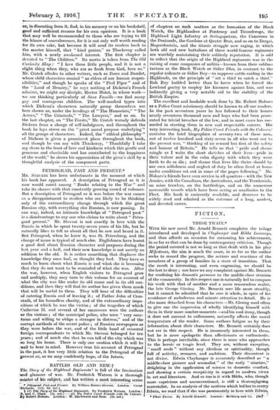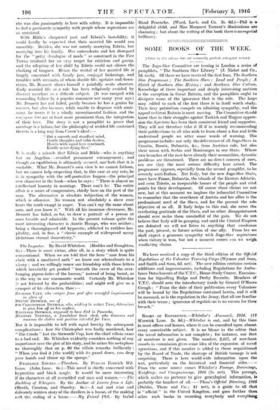FICTION.
THESE TWAIN.*
Wrrn his new novel Mr. Arnold Bennett completes the trilogy introduced and developed in Clayhanger and Hilda Lessways, and thus affords an occasion for measuring his achievement, in so far as that can be done by contemporary criticism. Though the period covered is not so long as that dealt with in his play Milestones, the aim is much the same, in so far as the author seeks to record the progress, the actions and reactions of the members of a group of families in a state of transition. That the result is interesting, and even engrossing, we should be the last to deny ; nor have we any complaint against Mr. Bennett for confining his dramatis personae to the middle-class stratum of the community. In this respect one is naturally led to compare his work with that of another and a more remorseless realist, the late George Gissing. Mr. Bennett sees life more steadily, but it cannot be admitted that he sees it whole, in spite of his avoidance of melodrama and minute attention to detail. He is also more detached from his characters—Mr. Gining used often to give one the impression of wholly identifying himself with them in their more sombre moments—andhis cool irony, though it does not amount to callousness, naturally affects the moral temperature of the reader. Some authors fatigue us by their infatuation about their characters. Mr. Bennett certainly does not err in this respect. He is immensely interested in them, but he is more apologetic than affectionate or enthusiastic. This is perhaps inevitable, since there is none who approaches to the heroic or tragic level. They are, without exception, " small souls " without any idealism or spirituality, though
full of activity, resource, and ambition. Their discontent is not divine. Edwin Clayhanger is accurately described as " si, middle-class pioneer and sensualist " of the early " nineties," delighting in the application of science to domestic comfort, and showing a certain receptivity in regard. to modern views in art and literature. And so too is it with Hilda, who, though more - capricious and unconventional, is stilt- a thoroughgoing materialist. In an analysis of the motives which ledher to marry Edwin, we read that if she was passionately in love with Edwin,
• These Twain. By ArnOid;Besinett. London : Mettrnewand-Co. Oct
she was also passionately in.love with safety. :It is impossible to feel a passionate sympathy with people whose aspirations are so restricted.
With Hilda's chequered past and Fslwin's instability, it could hardly be expected that their married life would run smoothly. Betides, she was not merely marrying Edwin, but marrying into his family. Her antecedents and her disregard for the " petty decalogue of mode " as construed in the Five Towns .rendered her an easy target for criticism and gossip, and the adoption of her child by Edwin could not silence the clacking of tongues. Hence the recital of her married life is largely concerned with family jars, conjugal bickering:4. and troubles with servants, of whose double life, upstairs and down- stairs, Mr. Bennett shows himself a painfully acute observer. Early married life. as a rule has been religiously avoided by discreet novelists as a difficult subject. (It was essayed with resounding failure by a popular romancer not many year ago.)
Mr. Bennett has not failed, partly because he has a genius for SlICCES9, but also because, while unable to dispense with seal- . meet, lie treats it in a wholly. unsentimental fashion, and the con:la:gm irae are at least more prominent than. the integration
of their love. The story. is not a pamphlet to prove that marriage is a failure, but the philosophy of wedded life contained therein is a long way from Carew's ideal :— " But a smooth and steadfast mind. Gentle thoughts and calm desires, Hearts with equal love combined, • Kindle never-dying fires."
It is really a miracle that Edwin and Hilda—who is anything but an Angelina —.avoided permanent estrangement ; and though- an equilibrium is ultimately secured, one' feels that it is unstable.. What Mr. Bennett's own view is we cannot fathom, but we cannot. help suspecting that, in this case at any rate, he is in sympathy with the self-protective Ingpen—the principal new character in the book—when he says: "There is almost no intellectual honesty in marriage. There can't be. The entire
affair is a series of compromises, chiefly base on the part of the man. The alternative is absolute Subjection of the woman, which is offensive. No woman not absolutely a slave ever hears the truth except in anger. You can't say the same about men, and you know it." With all his immense cleverness, Mr. Bennett has failed, so far, to draw a portrait of a person at once lovable and admirable. In .the present volume quite the most interesting character is Auntie Hamps, who was neither
being a thoroughpaced old hypocrite; addicted to ruthless hos- pitality, and, in fine, a " classic example of widespread messy
idolatrous eternal domesticity." •



































 Previous page
Previous page